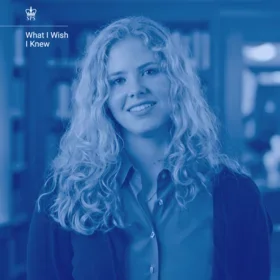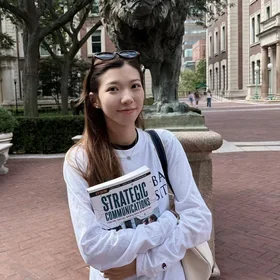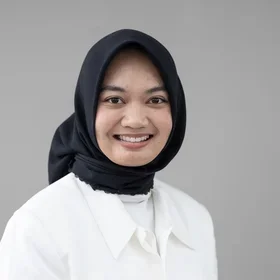When Adina Isenberg first came to Columbia University 16 years ago to study Strategic Communication, it was a world apart: “Back then, we didn’t have all this technology available to us,” she says. “If you couldn’t be in class, you’d have to conference-call in.” Pregnant with twins and working full-time as president of a publishing company, there were a few instances where Isenberg couldn’t be in-person. The program looked a little different in 2004, too: It required four years to complete. And when Isenberg needed to move to Toronto for work two years into her degree, there was no way for her to finish the program from afar. Columbia would have to wait.
“I went about my life and had great personal and career success,” Isenberg said. “But in the fall of 2017, I was unexpectedly diagnosed with breast cancer. My whole life exploded. I can’t think of one area that was not impacted in some way.”
At age 40, Isenberg wasn’t yet considered the age to be screened for breast cancer in Canada. But having a bad feeling about it and a family history, with the encouragement of her husband Michael, Isenberg set up an appointment with her longtime doctor in New York. “Thank goodness I did,” she said.
Confronting a Breast Cancer Diagnosis
Isenberg was diagnosed with Triple-Positive Breast Cancer.
“I ended up staying in New York for six weeks and had surgery there,” Isenberg said. “I had an amazing team. Triple-Positive Breast Cancer used to be among the most lethal, but, miraculously, two things happened. One, I was lucky and my instincts served me well because they caught the cancer early, Stage I. And two, we had long been supporters of the Susan G. Komen Foundation and it so happens that through research the foundation funded, they created a custom drug, Herceptin, which took this cancer from one of the worst to one of the ‘best’.”
Who would have thought that COVID, which is a horrible, terrible tragedy, actually brought tremendous opportunity in my life? Then again, having lived through adversity helped teach me the importance of being able to pivot."
When she found out she would need a year of treatment, there was a part of Isenberg that wanted to stay in New York for it: “I remember at the time thinking ‘At least now I can finish Columbia!’”
Ultimately though, Isenberg was encouraged to return home to Canada for chemotherapy, so she could be with her family. Albeit life was a little different: backyard meetings with global CEOs were commonplace on days when Isenberg was too weak to leave the house. But she was determined to retain some normalcy at work, including preparing questions for a Mark Zuckerberg interview while “slumped over” from radiation. She has since finished treatment and is busier than ever consulting, volunteering and engaging in philanthropy.
“There’s no such thing as guarantees in life, let alone with cancer,” Isenberg said. “But as these things go, this is as good as it gets.”
COVID-19 Opens a Door to Return to School
Isenberg was told early in the outset of the COVID-19 pandemic that she should avoid public places due to lowered immunity after cancer treatment.
“My medical oncologist said to me ‘go home and stay home,’ indefinitely,” Isenberg said.
This advice, coupled with her volunteer work at the breast cancer clinic being shut down due to the pandemic and seeing her twins, now 16, doing remote learning got Isenberg thinking: “How am I going to use my time productively if I am not allowed to leave the house?”
“So help me, I woke up one day and said ‘maybe I’ll give Columbia a call,’” Isenberg said.
After reaching out to the since-retired director of the Strategic Communication program, Isenberg was connected to current school leadership. The first step was for Isenberg to reapply to the program. Then, the advising and admissions teams were able to work with her to give credit for previously-completed courses and pave the way for her to continue online, given her health concerns.
It is so unbelievably rewarding to be able to implement what I’m learning right away. And so much is changing right now. What better place than Columbia to figure this out together with the best and brightest minds in the world?"
“Who would have thought that COVID, which is a horrible, terrible tragedy, actually brought tremendous opportunity in my life?” Isenberg said. “Then again, having lived through adversity helped teach me the importance of being able to pivot.” So with the support of her husband and children, she returned to Columbia and expects to graduate in Spring 2021.
“It was a big learning curve at the beginning, especially the new technology,” Isenberg said. “But my cohort held my hand and my sons helped me organize everything. This was meta for me: These kids that were in my belly the first time around, and now they were helping me with the IT!”
Columbia as a Game-Changer
Learning how to combine the latest technology with her own 20 years of professional experience and the latest theory in strategic communication has been a game-changer for Isenberg. “I feel like I have a leg-up on the competition now,” she said. “I’ve been able to give an edge to the financial institutions I advise, the luxury brands I counsel, and importantly, to the healthcare arena. Thanks to Columbia, I feel like Adina 2.0.”
“I’m such a nerd this time around,” Isenberg said. “I don’t want to miss one comma, one word, one anything. I don’t have to do as much work as I do, but I’m having so much fun that I can’t help myself.”
For example, Isenberg recently reached out to the author of a communication theory she was required to write about for class and set up a Zoom call to interview him, so she could incorporate it into her assignment.
“I said ‘imagine if Albert Einstein were alive and you were doing a paper on E=Mc2,’” Isenberg said. “‘If you could Zoom with the guy, wouldn’t you?’ Do I need to set up a Zoom? No. But do I love it? Of course. It helps me understand the material more deeply and apply it real-time.”
What Comes Next
As Isenberg finishes up her Executive Master’s, she’s also ramping up her consultancy work and focusing on giving back in the realm of patient care; using what she has learned from her own experience. As such, she’s also a Senior Advisor to Richard Paxman, the CEO of the company that produced the scalp cooling technology that saved her hair despite 12 rounds of chemotherapy. “A medical miracle,” she called it. “I was able to go from chemo to a CHANEL event and no one could tell.”
She is also using what she’s learning in the Strategic Communication program to help develop an app for breast cancer patients through the Princess Margaret Cancer Centre in Canada.
Women’s health in particular is considered secondary. We have to advocate for ourselves.This is your life, if you are 40 years old and you are high-risk for breast cancer, get a mammogram and ultrasound. If your doctors aren’t being receptive, keep calling until they listen to you. It is up to us to save our own lives."
“The things I’m learning now in Digital Strategy will help me to develop this app,” Isenberg said. “It is so unbelievably rewarding to be able to implement what I’m learning right away. And so much is changing right now. What better place than Columbia to figure this out together with the best and brightest minds in the world?”
After graduating, Isenberg hopes to give back to Columbia by teaching, and advocates particularly for people to go back to school. “Communications have changed,” Isenberg said. “It is a great idea for everyone to do what we can to continue evolving. The more we learn, the better off we are.”
Her advice for others when it comes to health is simple: “Trust your gut.”
“If I didn’t listen to my gut, I probably would have died by 42,” Isenberg said. “Women’s health in particular is considered secondary. We have to advocate for ourselves. When you’re at your most vulnerable, you don’t feel strong. You assume the system will take care of you, but it may not. Push for what you want. This is your life, if you are 40 years old and you are high-risk for breast cancer, get a mammogram and ultrasound. If your doctors aren’t being receptive, keep calling until they listen to you. It is up to us to save our own lives.”
Learn more about the Executive M.S. in Strategic Communication.


